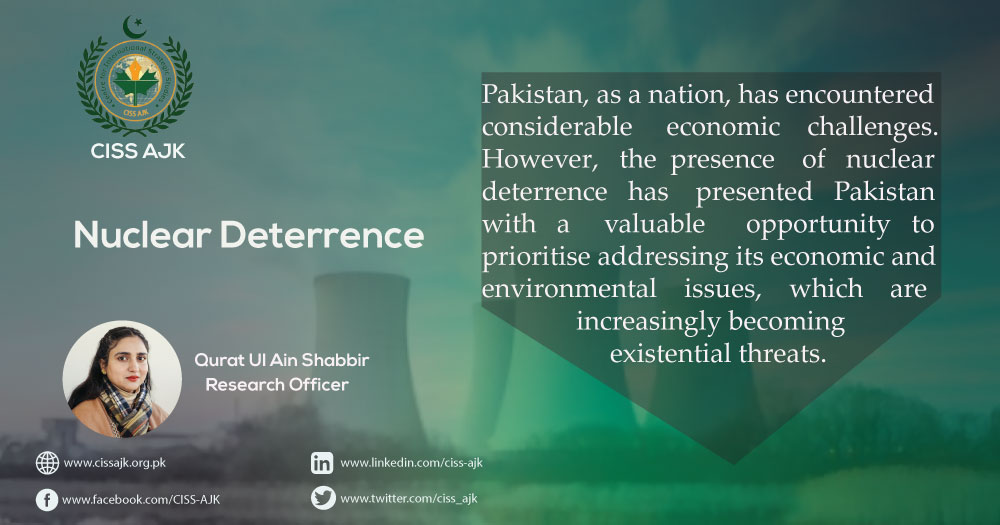603
The basic premise of the deterrence theory is that a country possessing nuclear weapons can prevent another country from any kind of aggression by threatening to respond with nuclear weapons. The logic behind this theory is that the prospect of a devastating counter-attack would discourage a potential aggressor from initiating an armed conflict in the first place. This theory is often associated with the concept of “mutually assured destruction” (MAD), which refers to the notion that the use of nuclear weapons by one state would inevitably lead to the destruction of both parties. Thus, both sides have a strong incentive to avoid using nuclear weapons altogether, since the consequences would be catastrophic for everyone involved. Deterrence theory rests on the assumption that all actors in the international system are rational and value their own survival. Thus, it is believed that no state would initiate an all-out war if they knew that it would lead to their own destruction. By threatening to retaliate massively, a country possessing nuclear weapons hopes to create a powerful incentive for potential aggressors to back down and refrain from armed conflict.
Keeping the aforementioned logic of nuclear deterrence in mind, the question that merits an answer is what nuclear deterrence can do for the comprehensive security of Pakistan? The possession of nuclear weapons has provided Pakistan with a sense of security and deterrence against external threats. It has also given Pakistan leverage in its relationships with other countries, particularly India. Since both India and Pakistan possess nuclear weapons, the threat of a catastrophic nuclear exchange has helped to maintain a balance of power. Furthermore, Pakistan’s possession of nuclear weapons has trivialised the need to engage in an arms race with India by creating a strategic environment in which both countries are deterred from launching an all-out war with each other. The possession of nuclear weapons has also ensured Pakistan’s territorial integrity and strategic stability, which has allowed the country to create fiscal space for economic activities and addressing domestic challenges.
The situation in Pakistan is similar to that of the United States in the 1950s, when the Eisenhower administration came up with the “massive retaliation” policy. This policy involved the use of nuclear weapons in response to a conventional or nuclear attack. The policy reflected the frustrations of the inconclusive conventional war fought in Korea and Eisenhower’s concerns about the economic burden of conventional rearmament. By assigning a greater priority to nuclear weapons, the United States was able to scale down its expensive conventional forces.
The security policymakers in Pakistan are fully aware of the significant disparity between India and Pakistan in terms of their overall arms possessions. This disparity is highlighted by the defence budget allocations of both countries. India has allocated a substantial amount of 1.62 trillion rupees (US $19.64 billion) to purchase new weapons and platforms between 2023 and 2024. In its annual budget released on February 1, India has allocated a total expenditure of 45.03 trillion rupees for this fiscal year, which includes an increase of 683.71 billion rupees (around 13%) to the total defence budget from the previous fiscal year. According to the Stockholm International Peace Research Institute (SIPRI), India had the third-largest military budget in the world last year, after the United States and China.
In contrast, Pakistan’s defence budget for the fiscal year 2022-23, which is PKR1.53 trillion (USD7.5 billion). This amount is significantly lower than India’s defence budget allocation, highlighting the significant disparity between the two countries in terms of their military capabilities.
Taking into account the substantial disparity in defence budgets between Pakistan and India, it becomes evident that Pakistan faces limitations in fiscal resources to effectively match India’s military capabilities.
Pakistan’s ability to maintain its sovereignty and gain strategic advantage against potential aggressors lies in its nuclear capability. According to experts in the field, the quantity of nuclear weapons is not the determining factor in a nuclear conflict. Even a single nuclear weapon has the potential to cause devastating consequences. In the realm of nuclear deterrence, it is not necessary for a nation’s stockpile to match its adversaries’ warhead for warhead because deterrence can still be achieved even with numerical asymmetry.
Even with a small arsenal, the massively destructive characteristics of nuclear weapons enable them to serve as a deterrent. Therefore, excessive expenditure on the construction of large arsenals is not only unnecessary but also increases the burden of safety and security.
Pakistan’s position can best be described through minimum means of reprisal concept. It asserts that a nation’s decisions regarding nuclear deployment and arms control are driven by the belief that the effectiveness of deterrence remains largely unchanged regardless of variations in the size, composition, and preparedness of its nuclear forces.
Pakistan, as a nation, has encountered considerable economic challenges. However, the presence of nuclear deterrence has presented Pakistan with a valuable opportunity to prioritise addressing its economic and environmental issues, which are increasingly becoming existential threats. In the current historical context, the survival of Pakistan hinges upon effectively tackling economic and environmental challenges. As nuclear deterrence serves to address external threats, Pakistan can now redirect its focus towards resolving internal threats and enhancing its domestic stability. By harnessing the potential provided by nuclear deterrence, Pakistan can work towards achieving comprehensive security by bolstering its economic resilience and addressing pressing environmental concerns.

